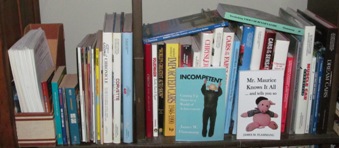Sample Chapter – Incompetent: Coming Up Short in a World of Achievement
1
Small Talk
They invariably started with cocktails. As a non-drinker, I wasn't tempted at all by the open bar, which served anything you wanted without charge. I attended these events because I had to, not because I enjoyed them; and each occasion began with a sense of impending doom.
For nearly 20 years, as part of my job covering the automobile business as an independent journalist, I attended several dozen out-of-town media drive programs each year. Each was held at a lavish hotel or resort, with nearly all meals presented at top-end restaurants. Only once or twice in all those years did we stay at a modest hotel, on the level of, say, a Comfort Inn. I've been in more W and Four Seasons hotels than I could count, and dined in an endless stream of four-star restaurants.
For most of the journalists, those luxury accommodations and chef-prepared meals are a major perk. So are the cocktail receptions that precede each meal, with alcohol beverages of every sort flowing freely. One journalist even boasted of his experience at a European media program, where he had the "opportunity" to try the most expensive liquor the opulent hotel could offer: $400 a shot and, as always, paid for by the car company that covered his way to the event.
In addition to alcohol, the common denominator at these receptions is conversation. Journalists who see each other at similar events every other week greet their comrades like long-lost brothers, and mingle in clusters with the public-relations and auto-company people to engage in small talk. For the convivial types, it's a chance to talk freely, loosened by alcohol, with representatives of the company, who might reveal some highly-coveted secret information about a future product. (This rarely happens, of course; the executives are quite good at revealing exactly what they want to disclose, and nothing more.)
What might be termed posterior-bussing (using an old Chicago term, heard during the administration of the first Mayor Daley, back in the 1950s and 1960s) is an integral part of the small-talk process. Each side – journalist vs. company executives – is striving to impress the other, one way or another; and to flatter the opposition when appropriate.
For shy, introverted attendees such as myself, the receptions are something to be dreaded: essentially, the price one pays for the privilege of getting advance information about a new vehicle. Small talk, to me, is practically tantamount to getting one's teeth extracted, one by one, without benefit of anaesthetic. As a result, I'm the one standing quietly in the corner, or wandering the room aimlessly, clutching my Ginger Ale with a tightened fist.
Part of the problem is that I have little or nothing in common with most of the journalists, much less the company folks, most of whom think highly of themselves and the presumed importance of their work. Much of the talk is about cars, as expected. In fact, some of the participants seem to have little to say about anything that lacks a motor. But the topics do vary. Thankfully, politics seldom enters the conversation, either at the receptions or during the excruciatingly long dinners that follow. Regardless, for non-conversational guests, the minutes, the hours, pass like particularly lethargic turtles that lack even a tentative destination, but simply move ahead at an agonizingly slow pace.
Obviously, many of them – like many people in general – love the small talk. For the talkers, that's a major part of life. For the conversational incompetents, such occasions are something to be avoided when possible, and endured when there's no way out.
The difference between these groups is one of many ways in which people are split into two never-meshing camps:
1. Those who talk freely and easily about minor or major matters with those they hardly know.
2. Those for whom "small talk" is a dreaded ordeal, to be evaded whenever possible.
Certainly, there are many other ways to separate people into "yea" and "nay" camps. But the ability to function orally in social settings makes an enormous difference in one's overall life. Those of us who cannot measure up are consigned to the periphery of social intercourse, whether for business or personal encounters.
Have you seen us? Sure you have, though you may not have noticed. We're the ones looking anguished and uncomfortable, painfully and glaringly alone, carrying a drink around as it were a bomb. Or, in some cases, guzzling down a string of them in the hope of instilling some artificial camaraderie. Slowly, tentatively, we may move a little closer to one of the clusters of conversationalists that have formed – but rarely close enough to be invited into the fold.
Note: This chapter is intentionally incomplete at this point, intended to serve as a sample.
© All contents copyright 2014-24 by Tirekicking Today



